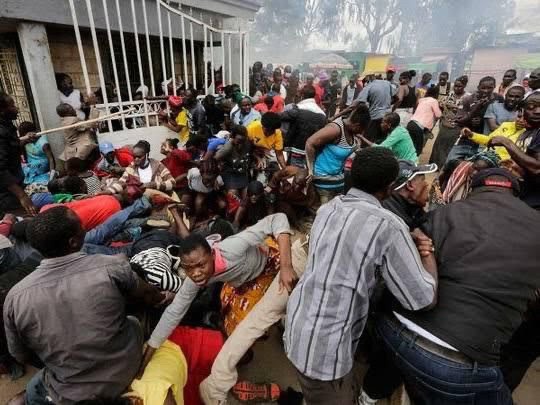
Stampedes during palliative distributions in Nigeria have left many dead and injured. Since President Bola Tinubu took office on 29 May 2023, at least four major incidents have been reported. These incidents have raised concerns about worsening economic hardship in the country.
On 23 February 2024, a stampede occurred at the Nigeria Customs Service (NCS) zonal headquarters in Yaba, Lagos. Seven people died while scrambling for 25kg bags of rice. The rice had been confiscated from importers and rebagged with labels reading “not to be sold.” The NCS later suspended the programme following public outrage. Femi Falana, SAN, sought justice for the victims through legal action.
In December 2024, another tragedy occurred in Ibadan, Oyo State. On 18 December, 32 children died during a poorly organised children’s carnival. The event was meant to provide food and N5,000 cash to participants. Overcrowding and inadequate planning were blamed for the disaster.
Three days later, on 21 December, stampedes were reported in Anambra and Abuja. In Okija, Anambra State, at least 20 people died during a rice distribution exercise. Videos from Okija showed lifeless bodies, with reports pointing to a lack of proper organisation. Earlier that same day, a fatal stampede occurred at the Holy Trinity Catholic Church in Maitama. Over 3,000 residents from Mpape and nearby settlements gathered for palliative items. Many had arrived as early as 4:00 AM. Chaos broke out around 7:00 AM, resulting in 10 deaths, including seven children. The church has since suspended its palliative distributions indefinitely.
Despite spending ₦42.5 billion on rice palliatives, a report by The Whistler revealed only 0.44 per cent of Nigerians benefitted. The UNDP’s 2023 Multidimensional Poverty Index estimates 37 per cent of Nigerians live in poverty, with 18 per cent in severe poverty. According to the World Bank, the proportion of Nigerians living below the national poverty line has risen sharply from 40.1 per cent in 2018 to 56.0 per cent, leaving 129 million people in poverty.
Although the recent stampedes have been blamed on poor planning and overcrowding, they starkly illustrate the severe hunger and economic distress affecting ordinary Nigerians. These fatal events occurred amid severe economic hardships.
Millions of Nigerians struggle to meet basic needs such as food, shelter, and healthcare. Increasing levels of insecurity and disruptions in agricultural production have further diminished food availability, pushing many families into desperation. According to the World Food Programme, approximately 25 million Nigerians are facing acute food insecurity, with millions more at risk as inflation drives up food prices. This dire situation has led to an increased reliance on charitable distributions for sustenance.
Labour Party presidential candidate Peter Obi has stated that these tragedies reflect systemic failures, including hunger and poverty. Without addressing these root problems, similar tragedies are likely to persist as desperation grows among Nigeria’s most vulnerable communities.
Read More:
- Court Stops Police From Remanding TikToker “Seaking” For Insulting Tinubu, Sanwo-Olu
- Speed Darlington Granted Bail After a Month in Detention
About The Author
Mayowa Durosinmi
author
M. Durosinmi is a West Africa Weekly investigative reporter covering Politics, Human Rights, Health, and Security in West Africa and the Sahel Region
Related Articles
Three Doctors Suspended as Medical Council Probes Death of Chimamanda Adichie’s Son
Nigeria’s medical regulatory authority has taken the rare and serious step of...
ByWest Africa WeeklyMarch 4, 2026Night Gunfire Near Presidential Palace Sparks Tension in Ouagadougou
Gunshots were heard late on the night of February 28 into March...
ByWest Africa WeeklyMarch 3, 2026Uganda to Start Domestic Gold Purchasing Programme to Boost Reserves
Uganda’s central bank has announced plans to launch a domestic gold buying...
ByWest Africa WeeklyMarch 3, 2026Ghana’s Cedi Expected to End 2026 Around GH¢12.85 to the Dollar
The Ghanaian cedi is projected to hold relatively steady against the United...
ByWest Africa WeeklyMarch 3, 2026













Leave a comment